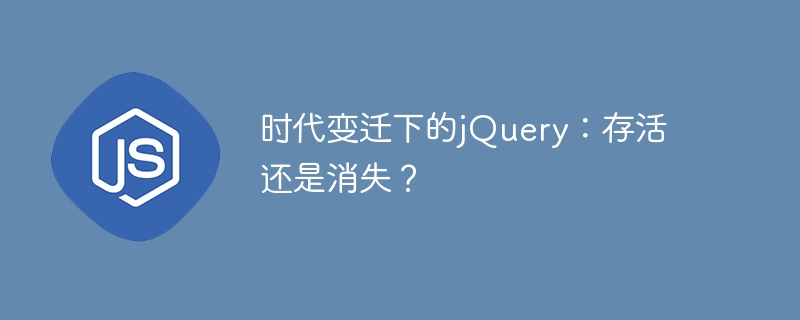Home >Web Front-end >JS Tutorial >The fate of jQuery in the ever-changing era: Will it continue to survive or disappear?
The fate of jQuery in the ever-changing era: Will it continue to survive or disappear?
- 王林Original
- 2024-02-23 18:00:291328browse

With the development and evolution of Internet technology, people's needs for front-end development are also constantly changing. In this ever-changing era, jQuery, a once popular front-end library, is also experiencing the struggle and choice between survival and disappearance.
Looking back on the past, jQuery was once a powerful tool for countless front-end developers. Its simple and easy-to-use API and excellent browser compatibility make people love it. In the early Internet era, the interactive effect of web pages mainly relied on JavaScript, and the emergence of jQuery undoubtedly injected new vitality into front-end development. It provides rich DOM operations, event processing, animation effects and other functions, allowing developers to easily implement complex interactive effects without having to pay too much attention to compatibility and code complexity.
However, with the continuous development of Web technology, more and more front-end frameworks and libraries with powerful functions and better performance have emerged, such as React, Angular, Vue, etc. The emergence of these new generation front-end frameworks has brought more choices and possibilities to front-end development, which has gradually shaken jQuery's status and influence to some extent.
Today’s front-end development environment has become more complex and diverse. To meet different user needs and improve user experience, more efficient and flexible front-end development solutions are needed. Although jQuery still performs well in simplifying DOM operations, event processing, etc., it has become somewhat inadequate in new areas such as performance, componentization, and data binding.
On the other hand, as browsers continue to increase their support for native JavaScript, some functions that originally required jQuery, such as cross-browser compatibility, asynchronous requests, etc., can also be achieved through pure JavaScript. accomplish. This has led some developers to question whether it is necessary to continue to rely on third-party libraries like jQuery.
Despite this, we cannot ignore that jQuery is still widely used in many old projects. Many websites and applications still rely on the stability and compatibility provided by jQuery. If you want to completely abandon jQuery, you may need to pay huge human and material costs. Therefore, jQuery still has its necessity in some projects with relatively low maintenance costs and relatively simple functions.
As the times continue to change, there seems to be no clear answer whether jQuery will survive or disappear. For front-end developers, choosing whether to continue using jQuery may require weighing various factors: project needs, development efficiency, maintenance costs, etc. As for jQuery itself, it may need to constantly update its functions and performance to adapt to the needs of the new era.
Whether jQuery ultimately survives or disappears, it has already left a mark in the history of front-end development. Its emergence and development not only changed our understanding and approach to front-end development, but also led to the rapid development of the entire front-end technology field. In this unpredictable era, only by constantly learning and adapting to changing technologies can we survive and thrive in the fierce competition.
The above is the detailed content of The fate of jQuery in the ever-changing era: Will it continue to survive or disappear?. For more information, please follow other related articles on the PHP Chinese website!

